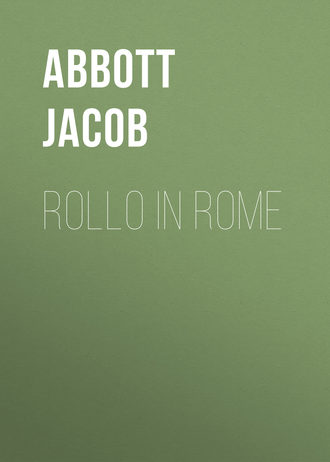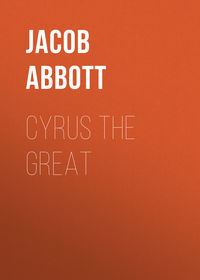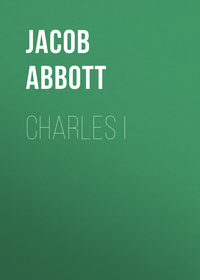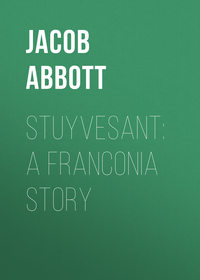
Rollo in Rome
It was a small girl, about thirteen years old, that opened the gate.
Rollo and his party found themselves ushered into a sort of garden. The girl led the way along a narrow path between beds of beans, lettuce, and other garden vegetables. Besides these vegetables, there were groups of shrubbery here and there, among which roses and other flowers were blooming. This garden seemed to be in the heart of the city, for it was bordered on three sides by buildings, and on the fourth by a low wall, which appeared to be built on the brow of a hill, for the roofs and chimneys of other houses, situated on a lower level, could be seen over it below.
The girl led the way to a place by this wall, where, by looking over, there could be seen, at a distance along the hill, a small place where the rock which formed the face of it was precipitous. The precipice seemed to be about ten or fifteen feet high.
"Is that the Tarpeian Rock?" asked Rollo.
The girl who conducted them did not reply, not knowing any language but the Italian.
"I've seen a great deal prettier rocks in America," said Allie.
"Then are you sorry you came?" asked Rollo.
"O, no!" said Allie; "I am very glad I came. But what is it that makes this rock so famous?"
"Why, it is the place where, in old times, a very remarkable thing happened," replied Rollo. "I read the story in the history of Rome, when I was studying history in America. There was a girl named Tarpeia. She lived somewhere near the top of this rock, and the wall of the city came somewhere along here, and there was a gate. The Sabines made war against the Romans, and came to attack the city, but they could not get in on account of the walls. One day Tarpeia was on the wall looking down, and she saw some of the Sabine soldiers walking about below."
"Why did not they shoot her?" asked Charles.
"O, they had no motive for shooting her," replied Rollo. "She was a nice, pretty girl, I suppose, and they liked to look at her, and to talk with her. Besides, they had a cunning plan in view. They asked her whether they could not induce her to open the gates and let them into the city. She said she would do it if they would give her what they wore on their arms. She meant their bracelets. The soldiers in those days used to adorn themselves with rings, and bracelets, and other such things. But then, besides these bracelets they wore their shields and bucklers on their arms. These were very heavy things, made of iron, and covered with hides. So they agreed that they would give her what they wore on their arms, secretly meaning that they would throw their bucklers upon her; but she thought they meant that they would give her their bracelets.
"So that night," continued Rollo, "the soldiers came, bringing a great many other soldiers with them, and Tarpeia opened the gate and let them in. The whole troop rushed by her into the town, as fast as they could go, and as they passed they all threw their bucklers upon poor Tarpeia, till she was crushed to death, and buried up by them. It was pretty near this rock where this happened, and so, forever after, they called it the Tarpeian Rock, and that is the reason why so many people come to see it."
There was a moment's pause after Rollo had finished his story, during which Allie looked quite concerned. At length she said, in a very earnest tone,—
"I think it was a shame!"
"I think they served her just right," said Charles.
"O, Charles!" replied Alice, "how can you say so?"
The girl who had conducted the party through the garden now began to lead the way back again, and they all followed her. As she walked along, the girl began to gather flowers from the beds and borders, and finally made quite a pretty bouquet. When she got to the gate, and was ready to open it, she presented this bouquet in a very polite and graceful manner to Allie. Rollo took some money from his pocket, and put it into her hand; and then she opened the gate, and let them all out.
"How much did you pay her, Rollo?" asked Charles.
"I paid her double," said Rollo, "because she was so polite as to give Allie such a pretty bouquet."
Allie was now more pleased with her bouquet than before. It pleased her extremely to find that Rollo took so much interest in her receiving a bouquet as to pay something specially for it.
So they all went down the steps which led to the foot of the Capitol Hill.
"Shall we walk home?" asked Rollo, "or shall I find a carriage, so that we can ride?"
"Let us walk," replied Allie, "and then we shall be longer on the way."
Just then Rollo, looking at the sky, saw that there were some rather threatening clouds diffused over it. Indeed, on putting out his hand, he plainly felt a sprinkling of rain.
"It is going to rain," said he, "and so we shall be obliged to ride. But we can make it longer by stopping to see something on the way."
"Well," said Allie, "let's do it. What shall we stop to see?"
"If there is going to be a shower," said Rollo, "it would be a good time to stop and see the Pantheon."
"What is the Pantheon?" asked Allie.
"It is an immense round church, with a great hole in the roof," replied Rollo.
"Why don't they mend the hole?" asked Charles.
"O, they made it so on purpose," said Rollo.
"Made it on purpose!" repeated Allie. "I never heard of such a thing. I should think the rain would come in."
"It does come in," said Rollo, "and that is the reason why I want to go and see the Pantheon in the time of a shower. It is so curious to see the rain falling down slowly to the pavement. You see, the church is round, and there is a dome over it, and in the centre of the dome they left a great round hole."
"How big?" asked Allie.
"It is twenty-eight feet across," said Rollo; "but you would not think it so big when you come to see it. It is up so high that it looks very small. We know how big it is by the size of the wet spot on the floor."
By the time that the party had arrived at this point in the conversation, Rollo saw a carriage standing in the street at a little distance before him, and he made a signal to the coachman to come to him. The coachman came. Rollo made his bargain with him, and they all got in. The coachman drove immediately to the Pantheon, and they arrived there just as the shower began to come on.
Before the church was an immense portico, supported by columns. The columns, and the whole entablature which they supported, were darkened by time, and cracked, and chipped, and broken in the most remarkable manner. Allie and Charles stood under the portico and looked around, while Rollo paid the coachman.
There was a large open square before the Pantheon, with an ancient and very remarkable looking fountain in the centre of it. There was a basin around this fountain, into which monstrous mouths, carved in marble, were spouting water. When Rollo had paid the coachman, he led the way into the church. Allie and Charles followed him. They found themselves ushered into an immense circular interior, with rows of columns all around the sides, and chapels, and sculptures, and paintings, and beautiful panels of variegated marbles between them.
Overhead was an immense dome. This dome is nearly a hundred and fifty feet high, and the circular opening in the centre of it is about thirty feet across. Through this opening the rain was descending in a steady but gentle shower. It was very curious to look up and see the innumerable drops falling slowly from the bright opening above, down to the marble floor. This opening is the only window. There is no other place, as you will see by the engraving, where light can come in.
The margin of the opening is formed of an immense brass ring. Such a ring is necessary in a structure like this, and it must be of great thickness and strength, to resist the pressure of the stones crowding in upon it all around.
This Pantheon was built by the ancient Romans, two thousand years ago. What it was built for originally nobody now knows. In modern times it has been changed into a church. It is immensely large, being nearly a hundred and fifty feet in diameter, and a hundred and fifty feet high. If you will inquire and ascertain what is the size of some large building in your vicinity, and compare it with these dimensions, you will form a clearer idea of the magnitude of this ancient edifice than you can acquire in any other way.
Rollo and his party rambled about the Pantheon, looking at the statues, and paintings, and chapels, and observing the groups of pilgrims and of visitors that were continually coming and going, for nearly an hour. By this time the shower had entirely passed away, and the sun having come out bright, they all walked home.
Chapter IX.
Going To Ostia
While Rollo was at Rome, he made the acquaintance of a boy named Copley. Copley was an English boy, and he was about a year older than Rollo. Rollo first saw him at the door of the hotel, as he, Copley, was dismounting from his horse, on his return from a ride which he had been taking into the country. He had been attended on his ride by a servant man named Thomas. Thomas dismounted from his horse first, and held the bridle of Copley's horse while Copley dismounted.
"There!" said Copley, walking off with a very grand air, and leaving his horse in Thomas's hands; "take the horse, Thomas, and never bring me such an animal as that again. Next time I ride I shall take Jessie."
"But Mr. William has forbidden me to give you Jessie," said Thomas. "He says she is not safe."
"It's none of his business," said Copley. "He thinks, because he is a little older than I am, and because he is married,—though he has not been married much more than a month,—that he has a right to order me about just as he pleases. And I am determined not to submit to it—would you?"
These last words were addressed to Rollo. Copley had been advancing towards the door of the hotel, while he had been speaking, and had now just reached the step where Rollo was standing.
"Who is he?" asked Rollo. "Who is William?"
"He is my brother," said Copley; "but that has nothing to do with it."
"Are you under his care?" asked Rollo.
"Why, I am travelling with him," said Copley; "but he has no business on that account to lord it over me. I have as good a right to have my way as he has to have his."
Some further conversation then followed between Copley and Rollo, in which the former said that he had been for several weeks in Rome, in company with his brother. He had an uncle, too, in town, he said, at another hotel.
"But I stay with my brother," said Copley, "because he is going to make a longer journey, and I want to go with him."
"Where is he going?" asked Rollo.
"Why, we have engaged a vetturino," replied Copley, "and are going to travel slowly to Florence, and from Florence into the northern part of Italy, to Milan and Venice, and all those places. Then, afterwards, we shall go over, by some of the passes of the Alps, into Switzerland. I like to travel in that way, I have so much fun in seeing the towns and the country. Besides, when we travel with a vetturino, I almost always ride on the outside seat with him, and he lets me drive sometimes."
"Then your uncle is not going that way?" said Rollo.
"No," replied Copley; "he is going directly home by water. He is going down to Civita Vecchia, to take the steamer there for Marseilles, and I don't want to go that way."
Copley then asked Rollo to go out into the Corso with him. He said that he saw a shop there, as he was coming home, which had a great display of whips at the window, and he wanted to buy a whip, so that when they set out on their journey he could have a whip of his own.
"The vetturino never will let me have his whip," said he. "The lash is so long that he says I shall get it entangled in the harness. That's no reason, for he is always getting it entangled himself. But that's his excuse, and so I am going to have a whip of my own."
"Well," said Rollo, "I rather think I will go with you; but you must wait here for me a minute or two. I must go up to my room first; but I will come directly down again."
Rollo wished to go up to his room to ask his uncle's permission to go with Copley. He made it an invariable rule never to go any where without his uncle's permission. Mr. George was always ready to give permission in such cases, unless there was some really good and substantial reason for withholding it. And whenever Mr. George withheld his consent from any of Rollo's proposals, Rollo always submitted at once, without making any difficulty, even when he thought that his uncle was wrong, and that he might have consented as well as not.
It was not altogether principle on the part of Rollo, that made him pursue this course; it was in a great measure policy.
"I like travelling about the world with uncle George," he used to say to himself, "and in order that I may travel with him a great deal, I must make it for his interest to take me. That is, I must manage so that he will have a better time when I am with him, than when he goes alone; and in order to do this, I must take care never to give him any trouble or concern of any kind on my account. I must comply with his wishes in every thing, and be satisfied with such pleasures and enjoyments as he fully approves."
Rollo did not think of this altogether of himself. It was his father that put the idea into his mind. He did it in a conversation that he had with Rollo the day before he set out on the journey.
"Rollo, my boy," said he, "in going on this journey into Italy with your uncle George, there is one danger that you will have to look out for very carefully."
"Getting robbed by the brigands?" asked Rollo.
"No," said Mr. Holiday; "it is something very different from that, and a great deal worse. That is to say, the evil that you have to fear from it is a great deal worse than any thing that would probably happen to you by being robbed. The danger is of your having too much independence, or, rather, a wrong kind of independence. What is independence?"
Rollo reflected a moment in order properly to frame his answer to his father's question. He thought he knew very well what the meaning of the word independence was, but he did not readily know how to clothe the meaning in language. At last he said that he thought independence was doing what you thought was best yourself, without regard to what other people thought.
"Very well," said his father. "That's a pretty good definition of it. And now, do you think it is a good quality, or a bad quality?"
"A good quality," said Rollo; "that is, I suppose it is good," he added, hesitatingly, "but I don't know."
"It depends upon circumstances," said Mr. Holiday. "Should you think that firing his gun when he thought best, instead of when the captain thought best, was a good thing in a soldier, on the field of battle?"
"No, sir," said Rollo.
"And so, would the independence of the colonel of a regiment," continued Mr. Holiday, "in marching when he thought best, instead of when the general ordered him, be a good quality or a bad quality?"
"Bad," said Rollo; "very bad indeed."
"Independence is an excellent quality in its own right and proper sphere," said Mr. Holiday; "but when it takes the form of disregarding or rebelling against right and proper authority, it is a very bad quality. It cannot be tolerated. If it were allowed generally to prevail among mankind, the whole world would be thrown into confusion, and nothing could go on. This is now the kind of independence that you must guard against. You are growing up rapidly, and increasing in strength and knowledge every day. You are becoming a young man, and in a great many of the situations in which you are placed, you are fully competent to take care of yourself. Still you are what the law calls a minor. That is, you have not arrived at an age when you can safely be your own master, and support and take care of yourself. Consequently, the law makes it your father's duty, for some years to come, to furnish money for your support, and to provide for you all necessary protection. And the same law makes it your duty to be under my direction, to conform your conduct to my judgment; or, in other words, to do, not as you think best, but as I, or whomsoever I may delegate to act in my stead, thinks best. This is reasonable. As long as a boy depends upon his father for the means of his support, it is right that he should act as his father's judgment dictates. It will be time enough for him to expect that he should act according to his own judgment, in his conduct, when he is able to earn his own living, and so release his father from all responsibility on his account. In a word, the pecuniary responsibility of the father, and the moral obligation of the son, go together."
"Yes, father," said Rollo; "I think that is all true."
"And now," continued Mr. Holiday, "I put you, for this journey, under your uncle George's care. I delegate my parental power over you to him. It is your duty, therefore, to obey him in all things, and to comply with all his wishes, just as you would if I were in his place."
"Yes, father," said Rollo, "I will."
"Besides being your duty," added Mr. Holiday, "it is greatly for your interest to do so. If you begin to show your independence, as it is sometimes called, and insist on doing what you think is best, instead of what he thinks is best, so as to cause him trouble, and make him feel anxious and uneasy on your account, you will spoil the pleasure of his journey, and he will not wish to take you with him again."
Mr. Holiday had some further conversation with Rollo on the subject, and the effect of what he said was to lead Rollo to think more than he otherwise would have done on the proper course which a boy ought to pursue when travelling under the charge of his uncle, and he resolved that he would, in all cases, not only obey implicitly his uncle's commands, but that he would comply readily and cordially with his wishes, whenever he could ascertain them.
Accordingly, in this case, he would not go even out into the Corso without first going up to obtain his uncle's permission. He opened the door of the room, and found his uncle there, writing a letter.
"Uncle George," said he, "here is a boy down below, who asks me to go out into the Corso with him."
"What boy is it?" asked Mr. George.
"I don't know what his name is," said Rollo. "He is an English boy, I suppose. He just came in from taking a ride on horseback."
"How long shall you probably be gone?" said Mr. George.
"I don't know," said Rollo, hesitating. "Perhaps about half an hour."
"Very well," said Mr. George; "you can be gone two hours if you choose. If you form any plan that will require more time than that, come home first and let me know."
So Rollo went down stairs again, and having joined Copley at the door, they went together out towards the Corso.
In the mean time, Copley's brother William and his wife were waiting in their room for Copley to come up. They knew at what hour he would return from his ride, and they had formed a plan for going in a carriage out upon the Appian Way, to see some ancient ruins there. They knew very well that Copley would not care any thing about the ruins, but he always liked to go with them when they took drives in the environs of Rome. The special reason why Copley was so much interested in going on these excursions was, that he was accustomed, in such cases, to sit on the front seat with the coachman, as he did when travelling with the vetturins, and sometimes he obtained permission to drive a little, by secretly offering the coachman a piece of money. Mr. William had charged his brother to come up to the parlor as soon as he came home from his ride, and Copley ought to have done so. But it was never Copley's practice to pay much heed to requests of this kind from his brother.
Mr. William, having waited for some time after he had seen the two horses arrive at the door, wondering all the time why Copley did not come up, went down to the door to inquire what had become of him. The concierge informed him that Copley had gone away with another boy, out to the Corso. So Mr. William ordered the carriage, and he and his wife went away on their excursion alone.
Rollo and Copley had a very pleasant walk along the Corso. They were obliged, however, to walk in the middle of the street, for the sidewalks were so narrow and so irregular in shape, sometimes growing narrower and narrower, until at length there was scarcely any thing but the curb-stone left, that Rollo and Copley could not walk upon them.
At last, however, they came to the place where Copley had seen the whips. Copley had plenty of money, but I do not know how he would have managed to buy one of the whips, if Rollo had not been with him; for the man who had them to sell could only speak French and Italian, and Copley did not know either of these languages. He had been studying French, it is true, for several years in school, but he had taken no interest in learning the language, and the little knowledge of it which he had acquired was not of such a character as to be of any use to him. As to the Italian, he knew nothing at all of it.
Accordingly, Rollo acted as interpreter.
"I might have brought our courier with us," said Copley, "only it is such a bore to have him about; and you do just as well."
After having bought the whip, Copley proposed that they should go to the diligence office and see if there were any diligences there about setting out on their journeys. The diligence office which Copley referred to was not in the Corso, but in another street, at right angles to it. When the boys reached the office, they found that there were no diligences there; so they rambled on without much idea of where they were going, until at length they came to the river, near one of the bridges leading across it. A short distance below the bridge, there was a small steamboat coming up the river.
"Ah, look there!" said Copley. "There's a steamer coming! Where do you suppose that steamer is coming from?"
"It is coming from Ostia, I suppose," said Rollo. "At any rate, I know that there is a steamer that goes to Ostia."
"Let us go there," said Copley. "Where is Ostia?"
"It is at the mouth of the river," said Rollo. "You may know that from the name. Ostia is the Latin word for mouth."
"I hate Latin," said Copley.
The little steamer came rounding up to a pier not far below the bridge. Copley and Rollo leaned over the parapet, and looked to see the passengers get out; but there were very few passengers to come. The boys then went down towards the pier, and on inquiring of a gentleman whom they saw there, they found that the boat went down the river to Ostia every morning, and returned every night, and Copley immediately conceived the idea of going down in her.
"Let's go down to-morrow," said he. "It is just far enough for a pleasant sail."
Rollo's imagination was quite taken with the idea of sailing down to Ostia. There seems to be something specially attractive to boys in the idea of sailing down to the mouths of rivers. It is so pleasant to watch the gradual widening of the stream, and to meet vessels coming up, and to see the fishermen's boats, and the nets spread on the land, and the little inlets, with the tide flowing in and out, and other indications of the approach towards the sea. Besides, Rollo wished very much to see what sort of a place Ostia was.
However, he would not positively promise to go. He said he should like to go very much, but that he could not decide the question until he should go home.
"I must see uncle George first," said Rollo. "It is possible that he may have formed some engagement for me to-morrow."
"O, never mind what engagement he has formed," said Copley. "Tell him that you can't go with him, because you have agreed to go down the river with me."
"No," said Rollo, shaking his head.
"Why, what a little fool you are!" said Copley.
After remaining some time on the bridge, looking at the steamer, the boys returned home. Rollo took care to arrive at the hotel before the two hours were expired. Mr. George had just finished his letter, and was folding it up and sealing it.
"Well, Rollo," said Mr. George, "have you had a pleasant walk?"
"Very pleasant, indeed," said Rollo. "We walked in the Corso till Copley had bought his whip, and then we went on till we came to the bridge, and there we saw a steamboat which goes to Ostia and back. Copley wants me to go down with him in her to-morrow. We shall get back about this time, I suppose."









